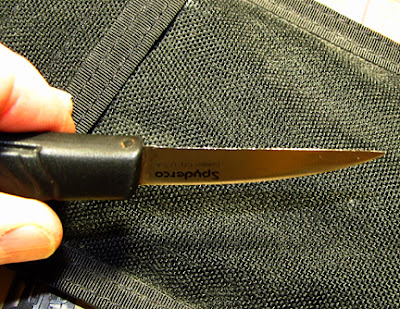New Year’s Day calls for a roasting pan full of pork, smoked
sausage and sauerkraut at my mother-in-law’s house. The food preparation is
relatively simple, but conflicts do arise.
I am convinced that my martial arts instructor got it
wrong. He once told us the Chinese ideogram for trouble was two women under the same roof. He’s wrong.
It’s an elderly mother and her daughter under the same roof.
Despite that, everything went fine except for the
knives. I have never seen two kitchen
knives so dull. Fortunately, I had my
Spyderco Sharpmaker available. Even more
fortunately, I own a pair of coarse diamond sharpening rods.
 |
| The silver diamond rod and a dull santoku |
Spyderco has made diamond rods for a number of years, but
the cost for diamond-impregnated rods was above and beyond affordable. Recently breakthroughs have brought the cost
down so mere mortals like myself can afford them. A retail cost of $80 for two rods isn’t
terrible. They also make a cubic boron
nitride for the same price.
The key, Spyderco’s Joyce Laituri told me, is not to bear
down hard, but to let the diamonds do the work.
It only took a few swipes on each side to get the knife which wouldn’t
tear paper to one that cut paper.
 |
| I've worked through the medium and ended with the white fine stone. Spyderco makes an extra fine, but I suspect I really don't need it. |
From there it’s working through the dark medium stones and
the white fine stones. I would suggest
not always starting the sharpening stroke at the back of the edge or choil, but
also at the knife tip. I find that gets
a better edge faster.
Years ago I was told about another knifemaker who used his
Spyderco Sharpmaker backwards. He
started down at the bottom of the V formed by the two stones and brought his
knife upward as well as towards himself.
This makes sense. You want to
draw the wire edge, where the real sharpness is, outward from the blade. When you strop an edge on leather or the
cardboard backing of a paper pad, that’s what you are doing.
You can do the same thing with a fine stone too!
 |
| That edge doesn't have a micro-serration. It's just badly damaged. (It's a crappy photo, hard to hold the knife at the right angle and camera.) |
The little santoku knife was dull, but the little Spyderco paring
knife was beyond dull. Holding the knife
upside down and staring where the edge should have been was unusual. I’ve never seen an edge that looks like tiny
polished diamonds before. Fortunately,
the diamond rods took the chips and gouges out right away and let me work to
the fine stones without too much trouble.
 |
| You see the side of the blade, but the not the edge. It isn't because I've sharpened to a sub-atomic edge, but because its sharpen enough to come to an edge smaller than the resolution of the eye. |
I’ve always enjoyed sharpening knives. There is a rhythm that seems to resonate with
me. It’s peaceful, calming work. I stand or sit and under my finger pressure
steel turns into an edge, one of man’s oldest and most important tools. There is a connection between me and first
person who wondered if they could make a favorite tool work again. I like that.
Have a Happy and Sharp New Year in 2016!




